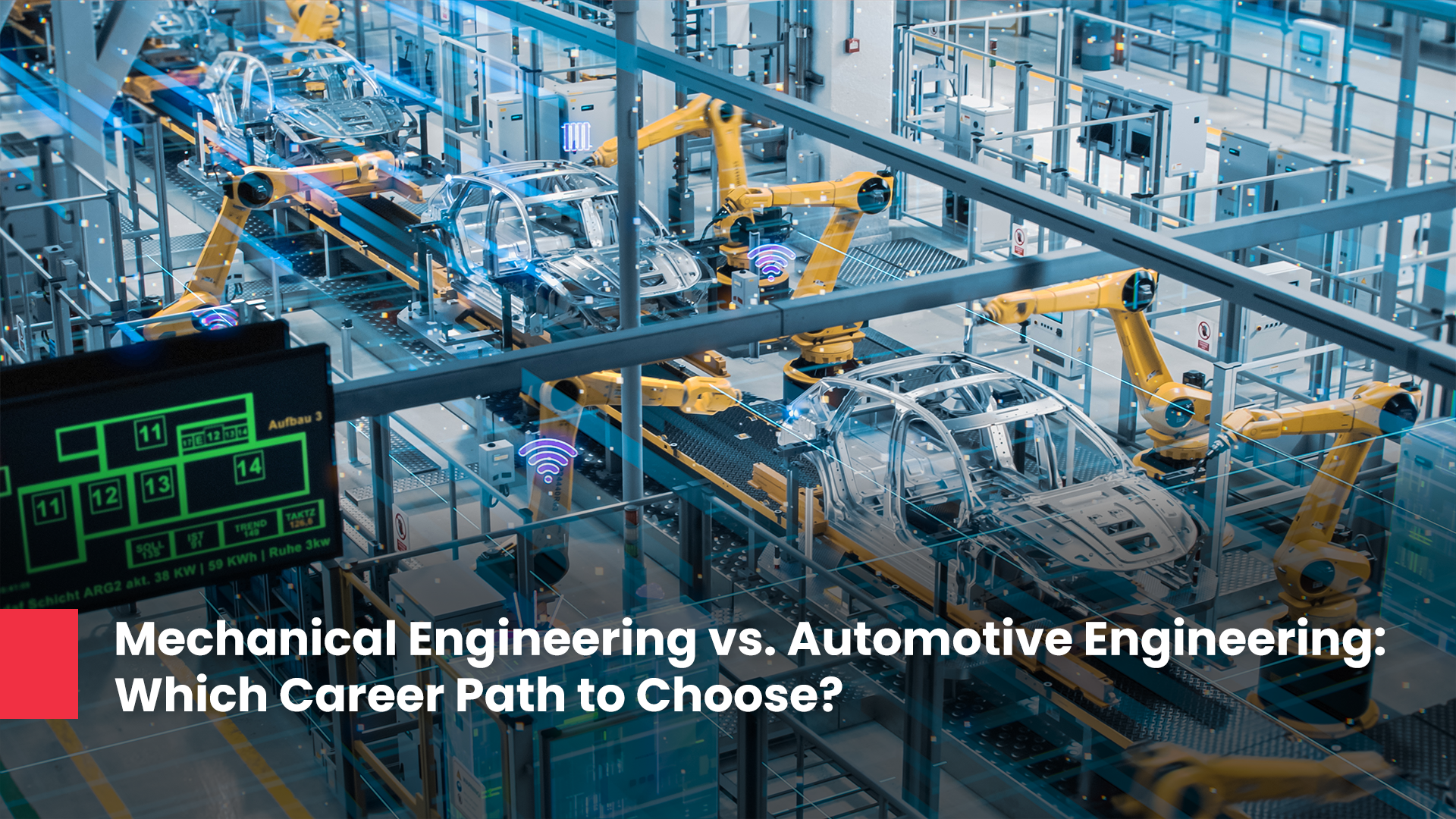
Deciding on an engineering career means considering specialised fields versus broader ones. Mechanical and automotive engineering offer exciting opportunities but focus on different interests and job paths. Aspiring engineers need to understand these differences to match their skills and interests with industry needs and innovation demands. Automobile engineering vs mechanical engineering comparison helps explain each field's unique opportunities, challenges, and potential careers, giving useful insights to help make the right career choice.
Table of Contents
Mechanical Engineering vs. Automotive Engineering: Which Career Path to Choose?
What is Mechanical Engineering?
What is Automotive Engineering?
Difference Between Automobile vs Mechanical Engineering
Scope in Automotive and Mechanical Engineering
Automotive Engineering
Mechanical Engineering
Mechanical Engineers vs Automotive Engineering: Salary
Mechanical Engineers Salary
Automotive Engineering Salary
Frequently Asked Questions (FAQs)
These days, many students are unsure whether to pursue a career in automotive engineering or mechanical engineering. Let's begin by explaining the main difference between them. Mechanical engineering programs mainly focus on fundamental mechanical subjects and theories related to mechanical devices. In contrast, automotive engineering is specifically centred around designing vehicles.
What is Mechanical Engineering?
You would learn about the principles of how machines and mechanical systems operate. For instance, you might study how gears work in a car's transmission system or how heat exchangers function in HVAC systems. The focus is on understanding the fundamental principles that apply broadly to various mechanical devices and systems.
What is Automotive Engineering?
This field focuses specifically on designing and improving vehicles. As an automotive engineering student, you might work on designing a more efficient engine for a hybrid car, optimising the suspension system for better handling, or integrating sensors and software for autonomous driving features. The emphasis is on applying mechanical principles specifically to the automotive industry.
Difference Between Automobile vs Mechanical Engineering
Scope in Automotive and Mechanical Engineering
Considering the rapidly expanding automotive industry, automotive engineering is currently in higher demand than mechanical engineering.
Mechanical engineers create and improve vehicles like buses and F1 cars. They focus on designing body structures, wheels, and engines. Other jobs in this field include automotive design, quality control, and transportation system planning. The car industry is set to expand by 2026 due to new technologies, leading to more opportunities for skilled workers.
Mechanical engineers have opportunities in various industries, such as manufacturing, aerospace, and energy. In manufacturing, they can serve as production engineers, quality control engineers, process engineers, plant managers, maintenance engineers, and operations managers. In aerospace, they can work as aerospace engineers, design engineers, research and development engineers, flight test engineers, propulsion engineers, and manufacturing engineers. In the energy sector, roles include energy engineers, thermal engineers, renewable energy engineers, power plant engineers, operations managers, and research and development engineers.
Mechanical Engineers vs Automotive Engineering: Salary
As of June 2024, the average monthly salary for a mechanical engineer in India is ₹30,000. Including additional earnings like cash bonuses, commission, tips, or profit sharing, the estimated total pay amounts to ₹33,167 monthly.
In India, automotive engineers earn between ₹2.5 lakhs and ₹10 lakhs per year. Entry-level positions typically start at the lower end of this range, while mid-level and senior-level positions offer higher salaries. As of 2024, Glassdoor reports that the average annual salary for automotive engineers in India is ₹12,18,855, with an additional average cash compensation of ₹7,18,855. AmbitionBox provides more detailed salary estimates based on experience: entry-level engineers earn an average of ₹5.4 lakhs per year, mid-career engineers earn ₹6.7 lakhs yearly, and experienced engineers earn ₹10.4 lakhs per year.
Frequently Asked Questions (FAQs)
1. What are the key regulatory challenges in automotive engineering that differ from mechanical engineering?
Automotive engineering involves stringent compliance with safety and emissions standards specific to vehicles, whereas mechanical engineering focuses on broader industrial standards applicable across various sectors.
2. How does the scope for government jobs differ between mechanical and automotive engineering graduates?
While both fields offer opportunities in government sectors like defence, railways, and public works, mechanical engineers often find roles in manufacturing and infrastructure projects, whereas automotive engineers might be sought after for roles related to transportation planning and vehicle design for government agencies.
3. What are the emerging technological trends that could impact careers in mechanical engineering over the next decade?
Advances in automation, robotics, and materials science are increasingly influencing mechanical engineering, which is critical in fields beyond automotive, such as aerospace and renewable energy.
4. How does the career progression differ between mechanical engineers in manufacturing versus automotive engineers in vehicle design?
Mechanical engineers in manufacturing may advance from production roles to management positions, while automotive engineers often progress through roles focusing on advanced vehicle technologies and design innovations.
5. What are some specialised roles within automotive engineering that require unique skill sets not typically associated with mechanical engineering?
Roles like automotive electronics engineers, hybrid vehicle specialists, and autonomous driving system developers require specific knowledge of vehicle-specific technologies, which mechanical engineers may not extensively cover in their training.
666, Upper Indiranagar, Bibwewadi,
Pune, Maharashtra, INDIA - 411 037.
For Admission :- 91 - 7058432258 / 8793428634
For Admission :- Office Timing :-
Monday to Friday - 10am to 5 pm